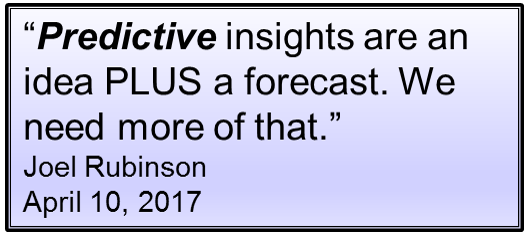Marketing research has an identity crisis. So now we have the Insights Association (a merger of CASRO and the MRA) a nd a speaker at the annual MRS conference in the UK saying we should no longer use the label “market research”. Is the word ‘Research ‘dead in favor of ‘insights’?
nd a speaker at the annual MRS conference in the UK saying we should no longer use the label “market research”. Is the word ‘Research ‘dead in favor of ‘insights’?
Dear researchers: the problem isn’t what we call it…the problem is that we are losing relevance for the key problems to solve in a digital marketing age. No wonder research budgets are frozen and big researcher companies struggle for even single digit growth.
Does programmatic marketing really deliver higher ROI? How do we construct segments to target via ad serving rules for best performance? How can we best use mobile marketing? What media strategy works best to drive trial for a new brand? How can we target where someone is in their purchase journey and does it actually produce better results? We cannot address these (and other) important prediction questions with legacy insights tools.
And in frustration, the marketing teams are turning elsewhere. A media client of mine told me, “The programmatic people tend to have disdain for “small data” researchers, and the researchers tend not to understand programmatic concepts and tools.”
The key is that the marketing research function needs to expand its mission:
“Driving repeatable marketing success through predictive insights built on data, evidence, and analytics.”
Predictive insights are an idea PLUS a forecast. To deliver, we need to move closer to the intersection of data science and marketing research, and seek a new kind of insight, predictive rather than descriptive. The word ‘repeatable’ is really important: predictive insights should be an annuity…producing improved performance each campaign, each brand, each year. And predictive insights are different from foresight (also needed)…they are built on analytics off of multiple data streams not scenario planning. At the intersection, insights needs to be held accountable for improving marketing ROI, not just delivering ideas.
Examples of predictive insights.
Driving return on ad spending. Recently, I was involved in designing an experiment on three brands where we were testing a connection between how shoppers choose brands on shopping trips and advertising responsiveness. Rather than just do some shopper insights study, we created an experiment using frequent shopper data. The segments we thought would respond best to advertising were proven to do just that. However, going in, we had no idea how high was up. In 3 out of 3 cases, we were able to drive up return on ad spend by more than 10X! That is an example of insights driving better business outcomes…practical, tangible, repeatable.
Driving trial for a new brand. A second example. I partnered with Marketing Evolution, a leading media analytics firm to create MoreCastR ™, a new product research offering. The purpose of MoreCastR is different from typical concept testing. We don’t just want to forecast trial, we want to CAUSE trial. MoreCastR identifies High Propensity Triers (HPTs) who have 5-10 times higher likelihood of buying the new brand, and then we model them at scale onto the client DMP. The idea is that MoreCastR will generate for its client a pool of 20-50MM cookies to target with launch advertising intending to drive 20-30% higher trial rates. MoreCastR is built to work for any new offering, food, non-food, CPG or not…doesn’t matter.
Fast pivot marketing. I am working with the Mobile Marketing Association to raise adoption levels of multi-touch attribution methods. These are consumer centric approaches for understanding, in close to real time, what marketing activities are working that leverage millions of observations occurring naturally from digital ad serving…an alternative to the large retrospective regression models that marketing mix modeling approaches use. MTA has an amazing promise since it can include user profiling variables, creative elements, and granular marketing levers in modeling what causes successful business outcomes. Do enough MTA analyses and we should be able to learn inductively what drives marketing effectiveness…those are insights you can take to the bank.
Call it Insights or research…if we stay with retrospective and descriptive insights, mostly rooted in surveys, we will lose relevance. If we embrace data science and predictive analytics, using the many data streams from Martech, as well as the data from a particular survey (another data stream) we can deliver insights that actually cause better marketing performance over and over again.
THAT’S the business we should be in.

